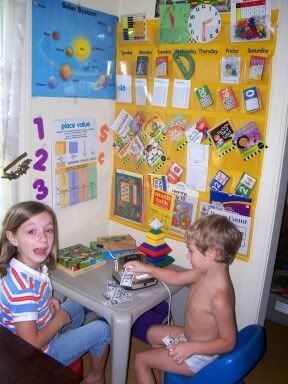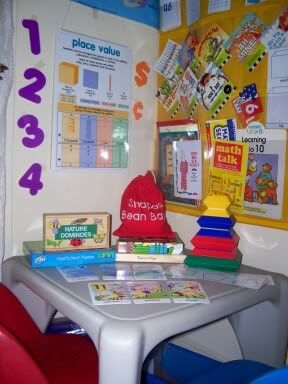Last year when we had trouble in math, it was suggested to make a math lab for Camille- to provide a fun place to do math. We were living in our other house so I was able to do that in a corner. This concept has worked for Camille, she says math is her favorite subject. In our new home, we do not have a math lab.


Here's a friend's math lab that inspired me (and many others). We like Horizons Math- I've been saying that for a while and yet what I like about Horizons Math is that it is a colorful workbook curriculum with a teacher's guide. It is not too busy with graphics and it has a spiral approach so Camille keeps reviewing the same concepts over and over again.
I became a little restless last year, hence the math lab, I didn't feel like Horizons was hitting the mark with Camille. Now again, this year I feel the same. The only thing preventing me from switching last year is that I could not find a program that I felt comfortable with, I looked extensively as BJU Math, RightStart, Math U See and other programs that receive very positive reviews. Of course after reading Real Learning by Elizabeth Foss- living math was what I wanted to do but didn't feel the confidence or know-how to accomplish it.
So we stuck with Horizons and I patted myself on the back for staying the course. I think we tried a few different things to help, eventually deciding to cut Camille's work- if she completed the first 1/2 correctly she doesn't have to do the second 1/2. I've used the Teacher's Manual fully, lightly, as a resource and still, I'm not satisfied.
I bought manipulatives, games and then realized we I didn't want to spend so much time on math, the lessons themselves were taking 30 minutes to 1 hour and playing with manipulatives & games just made the time longer. It seems silly not to WANT to take more time for math, something so crucial but I had it ingrained in my head that it shouldn't take 2-3 hours a day, that was an indication of failure.
Now, in 3rd grade- I'm faced with the realization that Camille may not understand much of what I've taught her over the last three years, just enough to accomplish the work but not to apply anywhere else. Yesterday I had her "play" a math game online, easy addition...she scored 25%. What?!? She's in 3rd grade!
She has adapted to Horizons, she does not internalize what she is learning- she just applies her short-term memory to the task in front of her. That is why I've had to reteach the same concepts over and over again. She also is a complete pencil to paper student, unable to do much mental math. I'm unable to teach her how to do mental math because I'm not sure HOW. I've read a few mental math books and I get confused! Lol.
Now for the complete honesty of why I chose Horizons in the first place:
1. It is self-contained, bought in a set complete with teacher's manual.
2. It is cheaper than other programs.
3. It seems rigorous, covering what public school students are covering in the same grade level plus the 1/2 the concepts of the next grade level.
4. Others who use it are homeschoolers I respect and their success (of older students going through the program) was encouraging. Standardized test scores have been wonderful.
Now I realize that:
1. Self-contained is nice but not as important as how the information is presented and learned.
2. Cheaper is nice but not if it is not effective.
3. Rigorous, great but what use is that if your child is not learning the material?
4. Other homeschoolers teach differently, know how to teach math and provide the instruction outside of the teacher's manual. Camille's standardized test scores are not as important to me as what she is learning, anyone can learn to pass the test.
All this and she SAYS math is her favorite subject. Oh boy. Now again, faced with the instinct that she needs something different, I started looking around again- keeping my eyes and ears peeled for reviews of other math programs. In a Charlotte Mason yahoo group I participate in (I mostly read others' messages), the question was posed about living math and Math on the Level was mentioned by its author Carlita.
I think I love it, it is so different from what we're doing now and would provide ME the help I need to understand math in order to teach our children. The pace is determined by the kids, not by a scope and sequence of what a publisher thinks the children should be learning. Math on the Level has resonated with me although I'm still not 100% sure. I've looked at all the other living math curricula that others mention and none of the others make me feel like, "I can do this."
Singapore, Math U See and a few others confuse me, I'll admit. I'm not a math person. I grabbed my copy of 100 Top Picks for Homeschool Curriculum by Cathy Duffy (invaluable book, I've been using it since the beginning and still use it when I have trouble) and I'm also looking into Moving With Math.
We will continue using Horizons until I figure this out. I have many books coming from the library to help me.
1. About Teaching Mathematics a K-8 Resource by Marilyn Burns
2. Teach Your Child Math: Making it Fun for Both of You by Arthur Benjamin
3. Family Math by Jean Kerr Stenmark
and from BookMooch.com (online book trading)
1. Mathematical Reasoning for Elementary Teachers (a textbook on how to teach math)
2. A Collection of Math Lessons from Grades 3-6 by Marilyn Burns
It is my hope with this post to have identified the exact reasons why I'm contemplating a switch in math programs, I am not looking just for the sake of wanting something new. Of course, if I find a different solution, I will post about it but for now- the research continues.





























17 comments:
I can't help you in regards to picking a math curriculum, but in regards to Mental Maths or Mental Arithmatic, the best approach is to do simple maths to the clock.
When I was in 5th grade for example, we would do mental arithmatic drills on a Wendesday. The teacher will call out the problem eg 5+9 and we would write down the answer within a time limit, generally about 30 seconds. Over time the problems would become more complex eg 25 + 15 - 10 and the time was reduced to come up with the answer.
A real world application to this is to go shopping and pick 2 items initially and add them up, gradually add in more items, or get them to calculate the change for the bill from the amount that you are giving (eg Total is $57.83 and you are handing over $70.00 to pay).
Hope this helps you.
Missy / Crystal Dolphin
Math is a tricky one for me as well. It's highly important to me that my kids be math savvy but I am not a math person - so all of the new ways of teaching math are totally foreign to me and I need a lot explanation and information to understand the hows and whys. The Marilyn Burns books you have listed are very helpful to me. I've also found it helpful to combine two curriculums. One reinforces the other and it "makes sure" that the student truly understands the concepts and isn't just a pro at doing a specific curriculum. (I use Math U See and Singapore)
I don't think math should take 2-3 hours a day but I don't think it takes an easy 30 minute time slot either, the math games and drill are a separate amount of time to us than the actual "math time". Good luck!
Have you looked into MEP math? It is based out of the UK, is available FREE online (or you can buy the books already printed) and has a yahoo list. Here is their course work RIGHT HERE and here is the yahoo group OVER HERE. The yahoo group has the password to unlock the second portion of each learning level, too, just FYI. We've used it on and off (are starting it back up today in fact) and I know a lot of CMers use it. Might be worth checking into.
After being a public school teacher I knew what I did not like and that was spiraling. If the student didn't get it the first time they were only more confused when you went on to another topic then revisited it.
I researched math for a year before G started Kindergarten, it is amazing how many programs there are. After going back and forth for hours at convention picking up and putting down Singapore & MUS, I ended up purchasing MUS. It is overwhelming to look at the book. It is thick, black & white, and has not illustrations or pretties just math. But I love the mastery approach. I love how they start from the beginning with story problems and pre algebra (x+3=5). I didn't realize how long mastery could take... we have been in Alpha for 1 1/2 school years. But that mild discomfort is my problem not G's. I am having to retrain my mind to this mastery mind set and slow and steady now will make the next phase easier.
{{HUGS}} I'm in the same boat! Have you looked at Developmental Math? It's a mastery approach, so it's not in line with state standards. BUT it does a great job at explaining everything, and without manipulatives. I will be supplementing a few things (telling time, measurement, shapes). I met a woman at our co-op that said she used DP with her kids and it gave them a solid foundation (they are now in jr high/high school and doing awesome). I'm also going to try some math copywork.
I began homeschooling my (step)daughter when she came to live with us going into 3rd grade (from a large public school). I knew her math was behind, but had no idea how behind she really was. I truly believe God threw Math U See at me (as it kept falling in my hands in my search for HELP!). As I began looking into it I gave her the suggested entry-level test. The first grade test was difficult for her. I just couldn't believe it -- was I going to have to start all over with her? I even called Math U See & said, "THIS CAN'T BE RIGHT?!" With great advice from MUS I started her on 1st grade level. I told myself it would just be a "review" -- Oh, no! It was the most difficult for her - I had to re-teach everything, BUT the great part about it was the way MUS teaches she didn't just learn how to work a problem - she UNDERSTOOD how & why. The first year was a lot of work, but we strived thru & the next year she started 2 months late on her grade level. She is now on level, using MUS & has little problems in math - it is her favorite subject now. I too was intimidated by the "way" MUS did things - It had to be thrown at me several times before I agreed to even look at it. Once you purchase it & do the first lesson it is much less intimidating & it is rather easy to use. Math usually takes us 30 minutes to an hour. On the flip side of that I have a 2nd grade son using MUS & he is actually 1 complete grade ahead. He is averaging completing 2 lessons a week. Someone else commented on how MUS is about mastery - this is true & wonderful for those that struggle & those that don't.
I know once we make the purchase & have the books we think it will work for every child, but like every homeschool family teaches differently - every child learns differently. Some curriculum will work for all your kids - others won't. That is one of the joys of homeschooling - you can recognize that & find what will work. Good luck in your search to find what will work for your family!
Can I suggest some freebies that you could try for the time being? I second the suggestion of MEP math, the online free program from the UK. We're slowly working our way through it, and it's exciting to me to see my 8 y/o working with algebraic concepts at this age! I am not whizzing through it, as we could do, but instead making sure the lessons are understood before working on to the next lesson.
Another freebie is Ray's Arithmetic at Google Books. I printed off the math tables in the second elementary book, then laminated them, and we use them for studying math facts. There's plenty of word problems in Ray's to use (for free!). The other thing I do is use some old workbooks such as Abeka that I bought for about 25c each for "warm ups" before starting the math lesson. This so far is working great for us. I will know if the proof is in the pudding when we test in April, but for now, this works, it's very cheap (or free!).
You could try these suggestions for a week and just see how it goes. I would back your daughter up to Yr. 2 or the latter part of Yr. 1 in MEP though, as some of the concepts are built in the earlier lessons.
Hope some of this helps! Don't stress to much. Maybe it would be helpful to just review and work with the free Ray's math for a couple of weeks to see where she stands with math facts.
Vicki
I can tell you - Math on the Level is as Living math as it gets! I can also tell you - it is teacher intensive. I am beginning to use it, and I really like it, but it takes some adjusting and it takes dedication. There is no "go do your math assignment" time. There are no workbook sheets to prepare weeks in advance. It is very organic, real time, and therefore very tailored to your child. Just know that you have to be disciplined enough to do it (which I think you are :), and ready to devote more of your time to teaching math. It does not take more time in the school day, just more teacher time - because everything is interactive. I higly recommend it, and if you are not on it already, check out the MOTL yahoo group - there are some wonderful people on there who have been using it much longer than I who can give you more info. We like it, combined with lots of math books (the Sir Cumference series, Serendipity suggestions, and the occasional waldorf approach lessons).
I think you are going to make a great choice! It sounds like you know what you're looking for - it just needs to grab your attention. I can't wait to see what you find. Could you love that Real Learning book more?? What a gem!! Good luck!!
I know you mentioned resistance to ABEKA products, but they really do have a first-class "self-contained" program. I encourage you to take a look.
A regular reader of your blog,
Charity
I know that you have mentioned resistance to ABEKA in the past, but they have a first-class "self contained" math program. I encourage you to take a look.
A regular blog reader,
Charity
Wow, do I ever know what you're going thru! We've been using ABEKA with our oldest (8, dylsexic)since we began homeschooling three years ago. It's worked alright, with a little hiccup here and there. When he's gotten stuck with a concept I've used a couple of Math-U-See tips which have cleared up the problem. Unfortunately, third grade has done us in with multiplication and division! I had heard that this would be the year math may fall apart for him. After much prayer and research, we're making the big switch over to Math-U-See.
It's scary to switch math curriculum after three years!! Good luck to you. I'll be interested to see what you decide.
Kathy D.
Hi Jessica,
Teaching math is always a challenge and the one thing that I have learned over the years is that there are peaks and plateaus. I can offer, expound, and drill but if the child is not ready, they will not "get" it.
With that said, I had one Abeka child and one Saxon child. Perfect fits for each one in the early years. Was it a pain to have two different programs? Yes. We did eventually switch both over to Saxon at about level 7/6 with the DIVE CDs. We took a break from Saxon last year for MUS Algebra...loved it. Now we are back to Saxon because it works. We actually are using Saxon Algebra 2 and TT Geometry at the same time, switching back and forth and the boys are enjoying the combo.
I have no regrets about switching programs at any point. Go with your guts.
Barb-Harmony Art Mom
I am just looking into MEP as angi reccomended. It is worth looking into...a lot of CM folks use it.
I've always liked your blog. Just another idea about math. I liked the idea of Singapore but my son just struggled. We did Moving with Math, which I liked but it seemed to move a bit slow. For 2nd and
3rd grade my son has been doing Math Mammoth (through Winterpromise) and I like it a lot. I feel like it has all the components of Singapore but moves slower and has more problems. It is affordable too. You might take a look at it. Thanks for all your great ideas that you share!
I didn't use a math curriculum until my son was in third grade. We did a lot of hands on math and workbooks before that. Then, I wanted to make sure he was "getting everything he needed", so I bought a Saxon 3rd grade kit homeschool version (after a LOT of research).
Saxon thoroughly explains everything and tells why and how to do everything. The teacher's manual tells you exactly what to say to the child and shows what the response should be. Also, Saxon doesn't stay on one topic for a whole unit. It does one lesson, then moves on to another topic for the next day, but the child reviews each concept daily so they don't forget. My son has thrived on this because he gets so tired of doing lessons about the same thing over and over. Since the concepts are revisited, the skills get reinforced often (plus the problems on the daily worksheets).
I had one of the new versions of Saxon 3. This year we are using an older version of 5/4. It is totally different. There's no teacher's guide, but only a solutions manual. The text book gives all the instruction and problems (which they have to copy on their own paper). I was afraid that my son would freak out switching to that method, but he still loves it!
One example of how great Saxon is about describing things is when they teach carrying and borrowing. They use play money in ones, tens, and hundreds. Each time (when adding) you get more than 10 ones, you trade them in for a ten. When you get more than 10 tens, you trade them in for a hundred. The opposite is true for subtracting. If you don't have enough ones, you trade in a ten for 10 ones. This makes the concept more concrete than just marking out numbers on a piece of paper.
I have a lot of homeschool friends who have tried Horizons (mostly because of the colorful pages) and either they hated it or it didn't work for their children, or both. I know that my son would never be able to do the same concept for days and days on end like that, so I've recommended Saxon and many of my friends switched to it and enjoy it.
Sorry to be so long, but I hope this helps in your search for the "right" math.
Have you looked at Rod and Staff Math? I have been using their 2nd grade to catch up my 3rd grader who is having difficulty.
They have samples on their site and it has really helped both my 3rd and 2nd grader with their math.
Post a Comment